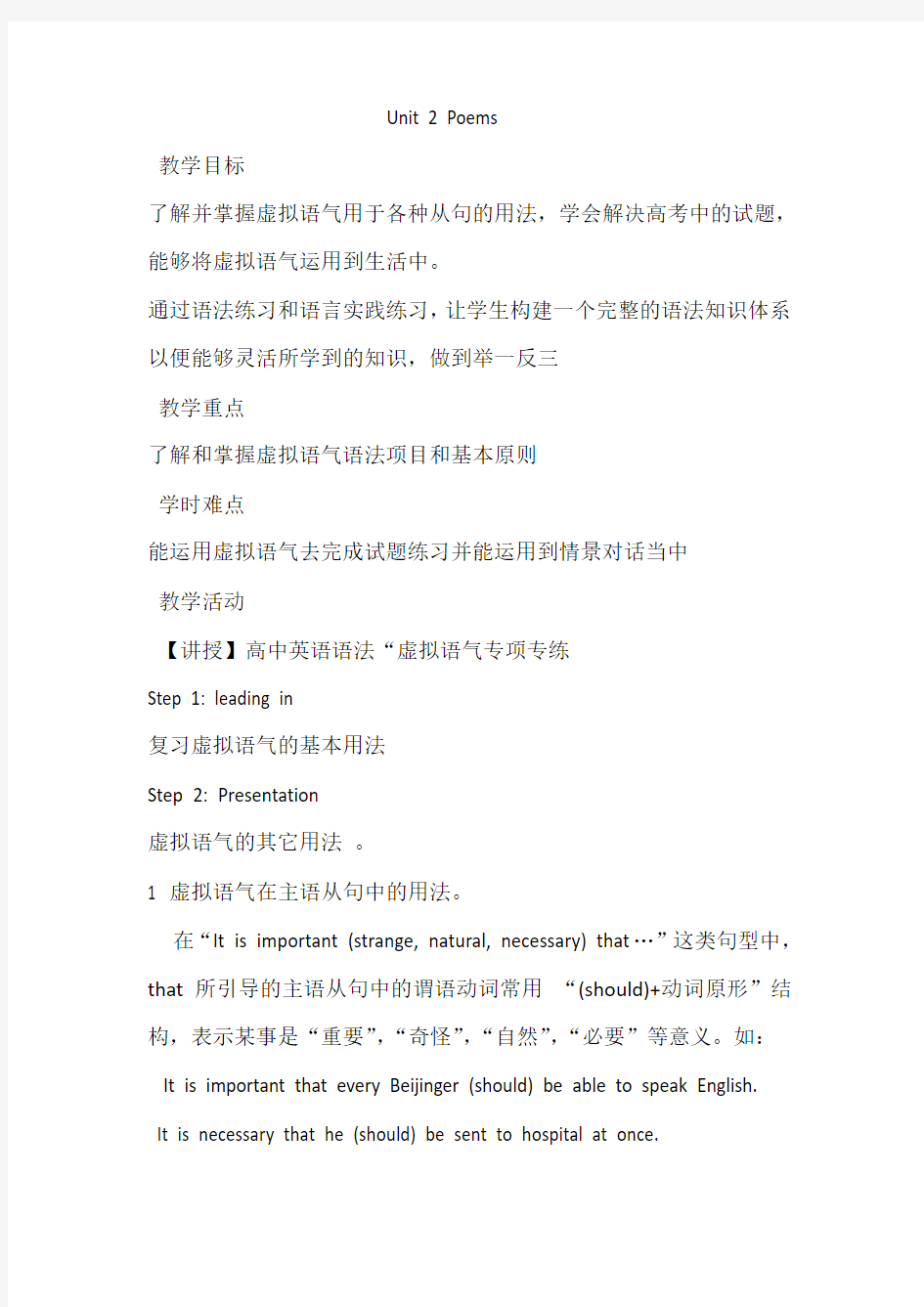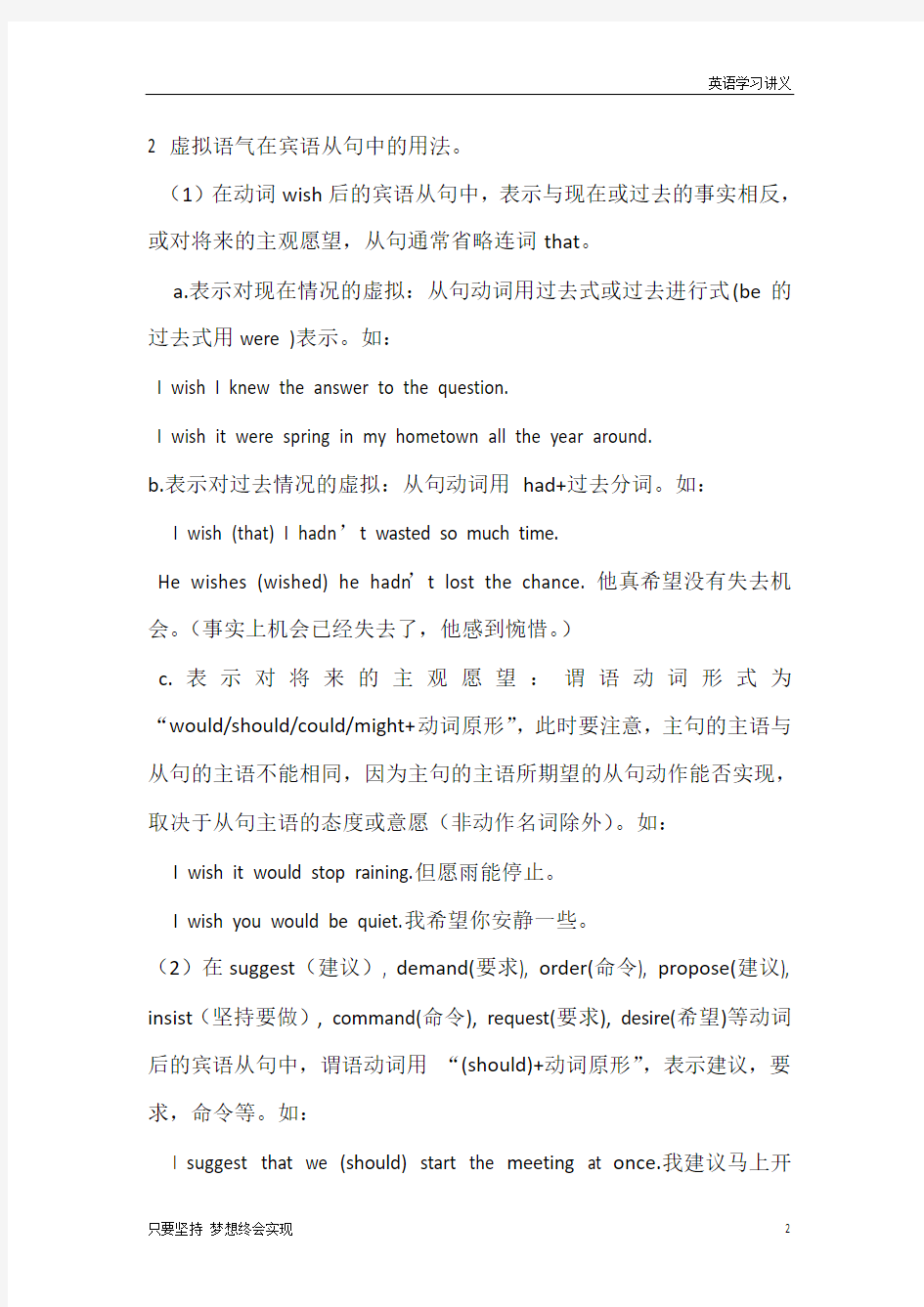

Unit 2 Poems
教学目标
了解并掌握虚拟语气用于各种从句的用法,学会解决高考中的试题,能够将虚拟语气运用到生活中。
通过语法练习和语言实践练习,让学生构建一个完整的语法知识体系以便能够灵活所学到的知识,做到举一反三
教学重点
了解和掌握虚拟语气语法项目和基本原则
学时难点
能运用虚拟语气去完成试题练习并能运用到情景对话当中
教学活动
【讲授】高中英语语法“虚拟语气专项专练
Step 1: leading in
复习虚拟语气的基本用法
Step 2: Presentation
虚拟语气的其它用法。
1 虚拟语气在主语从句中的用法。
在“It is important (strange, natural, necessary) that…”这类句型中,that所引导的主语从句中的谓语动词常用“(should)+动词原形”结构,表示某事是“重要”,“奇怪”,“自然”,“必要”等意义。如:
It is important that every Beijinger (should) be able to speak English.
It is necessary that he (should) be sent to hospital at once.
2 虚拟语气在宾语从句中的用法。
(1)在动词wish后的宾语从句中,表示与现在或过去的事实相反,或对将来的主观愿望,从句通常省略连词that。
a.表示对现在情况的虚拟:从句动词用过去式或过去进行式(be的过去式用were )表示。如:
I wish I knew the answer to the question.
I wish it were spring in my hometown all the year around.
b.表示对过去情况的虚拟:从句动词用had+过去分词。如:
I wish (that) I hadn’t wasted so much time.
He wishes (wished) he hadn’t lost the chance. 他真希望没有失去机会。(事实上机会已经失去了,他感到惋惜。)
c.表示对将来的主观愿望:谓语动词形式为“would/should/could/might+动词原形”,此时要注意,主句的主语与从句的主语不能相同,因为主句的主语所期望的从句动作能否实现,取决于从句主语的态度或意愿(非动作名词除外)。如:
I wish it would stop raining.但愿雨能停止。
I wish you would be quiet.我希望你安静一些。
(2)在suggest(建议), demand(要求), order(命令), propose(建议), insist(坚持要做), command(命令), request(要求), desire(希望)等动词后的宾语从句中,谓语动词用“(should)+动词原形”,表示建议,要求,命令等。如:
I suggest that we (should) start the meeting at once.我建议马上开
会。
The undergraduate insisted that he (should) go to work in the south. 注:当suggest表示暗示,主语为something;insist表示坚持观点时,后接的宾语从句当用真实语气。比较:
His silence suggested that he agreed with my decision.他的沉默暗示着他赞成我的决定。
He suggested that I (should) stick to my decision.他建议我坚持自己的决定。
He insists that doing morning exercises does good to people’s health. 他坚持认为做早操对健康有益。
He insists that he (should) do morning exercises every day.他坚持他每天都要早操。
3 虚拟语气在表语从句中的用法。
当主语为advice, suggestion, order, proposal等词时后接表语从句,表语从句中的谓语动词常用“(should)+动词原形”结构,表示某人建议、劝告、命令等的内容。如:
My advice is that you should practise speaking English as often as possible.我的建议是你尽可能经常地练习说英语。
The order from the commander was that the troops should set off for the front immediately.司令官的命令是部队立即开拔去前线。
4.特殊的虚拟语气结构。
(1)虚拟语气用在状语从句中
由as if 或as though引导的状语从句表示比较或方式时,从句中的谓语动词用虚拟语气。动词形式用动词的过去式(be→were)或had+过去分词。如:
The teacher treats the student as if he were her own child.这位老师带这位学生就象她的亲生孩子一样。
He speaks as if he had been to the United States.他说得好象他真的到过美国似的。
(2)在It is time (that) …; I’d rather (that)…句型中从句的谓语动词常用动词的过去式表示虚拟语气,意思是“该干某事了,时间已经有些晚了”“我宁愿/希望”。如:
It is time that we did something to stop pollution.该我们做些什么制止污染的时候了。
It is time that Father picked up Lily from the kindergarten.该父亲去幼儿园接莉莉的时候了。
I’d rather you told me the truth.我真希望你告诉我真相。
I’d rather I didn’t see you again.我宁愿不再见着你。
(3)虚拟语气用在简单句中
a 情态动词的过去式用于现在时态时,表示说话人的谦虚、客气、有礼貌、或委婉的语气,常用于日常会话中。如:
Would you be kind enough to show me the way to the post office?请你告诉我去邮局的路好吗?
It would be better for you not to stay up too late.你最好别熬夜到很
b在一些习惯表达中。如:
You’d better set off now.你最好现在就出发。
I’d rather not tell you the secret.我情愿不告诉你这个秘密。
c用“may+动词原形”表示祝愿,但愿,此时may须置于句首(多用于正式文体中)。如:
May good luck be yours!祝你好运!
May you be happy!祝你快乐!
用动词原形。例如:Long live the people!
5.虚拟语气在同位语从句中的用法
在名词advice, suggestion, order, proposal等后接的同位语从句中,谓语动词用虚拟语气,其形式为“(should)+动词原形”,说明“建议”,“劝告”,“命令”等的具体内容。如:The order came that the work should be finished two days ahead of time.提前两天完成工作的命令传来了。
Reluctantly she accepted their proposal that she should be operated on.
虚拟语气的几种特殊情况
(一)主从句时间不一致情况下的虚拟语气(混合条件句) 有时条件从句中的动作和结果与主句中的动作,发生的时间不一致,这时动作的形式应根据它所表示的时间加以调整。如:If you had followed my advice, you would be able to finish the work
If you hadn’t lent me some money, I couldn’t have bought the new house and most likely I would be still living in the dangerous house now.假若你不借钱给我,我不可能买下这幢新房,很可能现在还住在危房里。(从句说明过去,主句说明过去和现在。)
(二)含蓄条件句
非真实条件句中的条件从句有时不表达出来,只暗含在上下文中,这种句子叫做含蓄条件句。含蓄条件句大体有三种情况:1.条件暗含在短语中
He would not get such a result without your help. 没有你的帮助,他就不会有今天的成果。(条件暗含在介词短语without your help中) But for you, I could not be recovered so soon. 要不是有你,我就不会恢复得这么快。(条件暗含在But for you中)
He must have been there, or he never could know the place so well.他一定是去过那儿,否则他绝不会对那个地方如此熟悉。(暗含条件是连词or)
They could have won.他们本来是会赢的。(条件可能是if they had been patient 如果他们有耐心的话)
Such mistakes could have been avoided. 这种错误完全能避免。(条件可能是if you had been more careful 如果你更加小心一点的话)
--- Did you go to see him yesterday 你昨天去看他了吗?
--- I would have, but someone dropped over to my house for a visit. 原
想去的,但有人到我家来玩了。(条件是if no one had dropped over to my house for a visit 如果没人到我家来玩的话)
She was ill, otherwise she would have been present at the meeting. 她病了,否则的话就会出席会议了。(条件通过连词otherwiseor表示出来If she had not been ill...)
I told him to go there himself, but perhaps I should have gone together with him. 我让他自己去那里,但也许我应该和他一道去。(连词but 暗示条件)
(三)条件从句中省去if的情况
在if引导的表示虚拟的条件状语从句中,常可以省略if,将had, were或should提至句首。如:
Had I seen the film, I would have discussed it with them last night. 假如我看了那部电影,昨晚我就可以和他们一起讨论了。
Were I a bird, I could fly freely. 假如我是一只小鸟,我就能自由翱翔。
Should it rain next week the farmers would have a good harvest. Step 3: Consolidition
作业:
完成所发的虚拟语气专项练习。
板书设计:
虚拟语气的其它用法
1 虚拟语气在主语从句中的用法
英语学习讲义
2 虚拟语气在宾语从句中的用法
3 虚拟语气在表语从句中的用法
4.特殊的虚拟语气结构